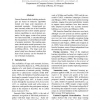Free Online Productivity Tools
i2Speak
i2Symbol
i2OCR
iTex2Img
iWeb2Print
iWeb2Shot
i2Type
iPdf2Split
iPdf2Merge
i2Bopomofo
i2Arabic
i2Style
i2Image
i2PDF
iLatex2Rtf
Sci2ools
120
click to vote
ACL
2010
2010
Towards Open-Domain Semantic Role Labeling
Current Semantic Role Labeling technologies are based on inductive algorithms trained over large scale repositories of annotated examples. Frame-based systems currently make use of the FrameNet database but fail to show suitable generalization capabilities in out-of-domain scenarios. In this paper, a state-of-art system for frame-based SRL is extended through the encapsulation of a distributional model of semantic similarity. The resulting argument classification model promotes a simpler feature space that limits the potential overfitting effects. The large scale empirical study here discussed confirms that state-of-art accuracy can be obtained for out-of-domain evaluations.
ACL 2010 | Computational Linguistics | Large Scale | Large Scale Repositories | Semantic Role Labeling |
Related Content
| Added | 10 Feb 2011 |
| Updated | 10 Feb 2011 |
| Type | Journal |
| Year | 2010 |
| Where | ACL |
| Authors | Danilo Croce, Cristina Giannone, Paolo Annesi, Roberto Basili |
Comments (0)

